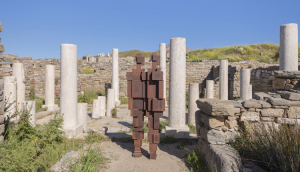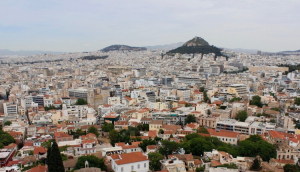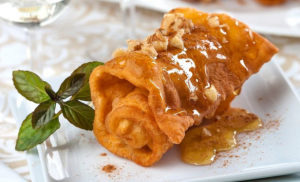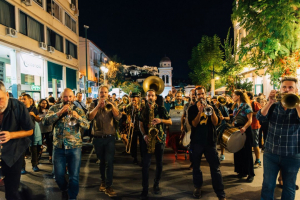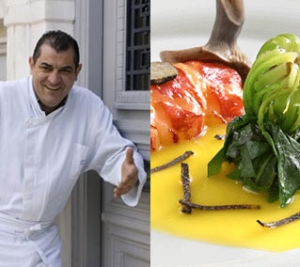BUSINESS CENTRE
XpatAthens
Athens International Airport Among The Best In Europe For 2017
Photo Credit: Greek Travel Pages
May 29 - Inspiring Women Around Greece
Famous British Sculptor Puts 'Inhabitants' Back On The Sacred Island Of Delos
Delos is ancient Greece's most sacred island and one of the most visited archaeological sites in the country. The legacy of Delos is inversely proportional to its size; in fact, the tiny island is barely 5km long by 1.5km wide. Apart from being the birthplace of the ancient gods Apollo and Artemis, it was also one of the greatest ancient Greek sanctuaries.
Today, remarkably preserved ancient remains such as votive offerings, sculptures, and temples stand next to relics from the period when Delos was an important commercial center, attracting thousands of visitors each year!
It is on this unspoilt island that Greek authorities have undertaken an exciting and ambitious experiment. Sir Anthony Gormley, the famous British sculptor, has placed 'inhabitants' back on Delos. He has created 29 iron 'bodyforms', that are to be the first artworks to be erected on Delos since it was populated–more than 5,000 years ago!
"If this works, our hope is it will help change how people approach ancient monuments," says Dr Demetrios Athanasoulis, who heads the department of antiquities in the Cyclades. "There is no past without the present, and we live in times where there are any number of windows through which to view the past."
Before visitors even disembark from the ferry from Mykonos, they are greeted by one of Gormley's 'bodyforms'. On a rock at the water's edge stands a mysterious, lonesome figure, gazing toward the horizon. The invitation to exhibit his work in a place where no artist has set foot for thousands of years was both "an amazing privilege and extraordinary responsibility", "It's been a huge challenge but what a place to think about the human project," he says.
For Dr Athanasoulis, only time will tell whether the experiment has worked. "It's only natural that some won't like what they see in Sight," he quips. "It will end in October, and only then will we really know how successful this has been."
To read this article in full, please visit: The Guardian
Image Credit: The Guardian
Upcoming Traffic Restrictions Due To The 6th Lycabettus Run
Restrictions will apply to the entire length of the following avenues: Paligenesias, Daskalogianni, Sarantapihou, Ksanthipou, and Evelpidos Ragakou. These limits will not affect the two major intersections between the aforementioned avenues.
Koniari Avenue will be closed between its junctions with M. Merkouri Avenue and Nikotsara Avenue. This closure includes any intersections between these two points.
The entire length of Kleomenous Avenue and its adjoining intersections will also be closed off.
Finally, traffic will be restricted on M. Merkouri Avenue, between its junctions with An. Polemou Avenue and Lahitos Avenue, as well as any other intersections between these two points.
If you don’t have any Sunday plans, though, consider making your way down to the center to support the runners!
Originally posted on Athens Voice, translated by Xpat Athens
Where To Go Out On The Athens Riviera
Sundowners on the Athens Riviera
No night out on the Athens Riviera is complete without a sunset cocktail by the sea. With its parquet floors, high ceilings, and potted palms, Ark on Glyfada’s Asteras Beach has a country club charm (minus the steep membership fees). If in doubt about what to order, go for one of their cocktails with a Greek twist such as the Mai Tai with kumquat from Corfu and bergamot from the Peloponnese, or the margarita made with smoked salt and bee pollen.

Photo Credit: Ark Glyfada
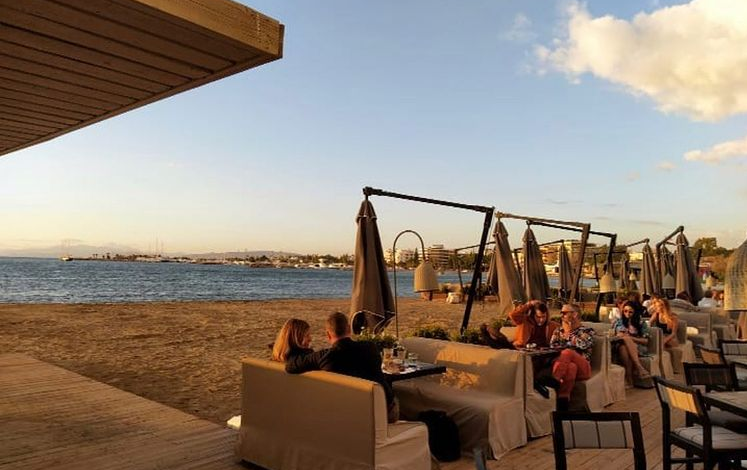
Photo Credit: Balux Cafe
Seagulls wheeling against a setting sun. Wicker lanterns swaying to subtle bouzouki music. Occasional sea spray on your toes. Taverna 37 at the Four Seasons Astir Palace nails most people’s fantasy of seaside dining in Greece. Set apart from the main resort on a stretch of boardwalk just inches from the water, this contemporary taverna is perfect for a serene dinner date. The menu is refreshingly unshowy, given the location. There’s nothing you won’t find at your average neighborhood taverna; what sets this place apart are the impeccable ingredients, smiling service, and sensational setting.

Photo Credit: @bokbokeh

Photo Credit: Nero Vouliagmeni Lake
If Vouliagmeni is the place for romantic waterfront dining, Glyfada is Riviera’s late-night playground. There’s no sea view. You go for the entertaining optics of the image-conscious locals gathering nightly to see and be seen on mood-lit pavements and in leafy courtyards. At times, it feels like one big film set. Especially on fashionable Kiprou Street, which runs parallel to the main shopping strip of Metaxa Street.

Photo Credit: Su Casa

Photo Credit: Varkiza Resort
Whether you've just arrived in town – or have been here for years – Athens always has new secrets to share!
Diples - Greek Honey Rolls Recipe
Ingredients
- 2 flat tbsps sugar
- 2 flat tbsps baking soda
- 350–400g all-purpose flour
- 5 eggs (divided into yolks and whites)
- juice of 1 lemon
- juice of 1 orange
- 1 tbsp white wine vinegar
- 1/2 cup corn oil
- a pinch of salt
- vegetable oil for frying
- 1/4 of a cup sugar
- 1/4 of a cup water
- 1/2 cup honey
- juice of 1/2 lemon
- 1 cinnamon stick
- 150g chopped walnuts, for garnish
1. Place the egg whites into the bowl of the electric mixer, along with a pinch of salt. Whisk the egg whites until the mixture is very thick and glossy.
2. Add the egg yolks one at a time, whilst mixing. In a cup add the orange and lemon juice and baking soda and blend, until dissolved, and pour in the egg mixture. Add the white wine vinegar and the sugar and mix.
3. Pour the mixture in a large bowl or basin and sift in the flour; add the oil and knead the dough using your hands, until smooth and elastic.
4. Separate the dough into four pieces, cover with some plastic wrap and let it rest for 30 minutes.
5. Using a rolling pin, roll out each part of the dough into thin rectangle sheets.
6. Using a rolling cutter, cut the rolled-out dough into rectangular pieces or square pieces. Heat the oil in a large frying pan, and deep fry the diples in batches of 3-4 at a time, pushing them down with a fork and flipping their sides until colored.
7. Prepare the syrup for the diples. Pour in a pot all the syrup ingredients and bring to a boil; boil for 5 minutes, until the sugar has dissolved.
8. Place the diples on a serving platter and drizzle with the syrup (or if you like them extra syrupy, soak each one in the syrup for a few seconds). Sprinkle with ground walnuts and cinnamon.
To read the recipe in full and discover another, more traditional but a bit harder way to make the diples, please click here: mygreekdish.com
Celebrity International Movers & Relocation Experts
With established local and international experience since 1986, and a genuine passion for what they do, Celebrity International Movers has been a trusted name in the moving and relocation industry, offering top-quality, tailor-made services for individuals, families, and businesses across Greece and beyond.
Headquartered in the Attica region of Greece with a strong global network of expert partners, this family-run company blends international standards with a warm, personal touch. From full household moves and corporate relocations to delicate fine art transport and secure storage solutions, Celebrity handles each project with care, precision, and professionalism. Their experienced team works closely with clients to create smooth, stress-free moving experiences—no matter the destination.
-
Domestic & International Household Removals
-
Full Relocation Services (housing, schools, lifestyle support)
-
Office Moves with strategic planning and timeline adherence
-
Specialized Transports: Fine Art, Pet Moves, Exhibitions, and Vehicles
-
Short- & Long-Term Storage in modern, secure facilities
Celebrating The Longest Night Of The Year In Athens
On Saturday, December 20, neighborhoods across the capital, from Monastiraki and Victoria Square to Pangrati, Lambrini, Ermou, and Omonia, will come alive with ten different events unfolding simultaneously. From live bands and DJ-led street parties to jazz, classical music, dance happenings, and even wellness activities, the city encourages everyone to wander, celebrate, and rediscover Athens through sound and rhythm.
Dancing To Global Beats
Latin Christmas Party – Kerameikos (2:30 p.m.)
Salaminos Street transforms into a lively Latin-inspired celebration, complete with vibrant vinyl sets, street food aromas, and rhythms that evoke Rio, Havana, and beyond. A festive escape with a summery twist right in the heart of Athens.
Protogenous Street Festival (5 p.m.)
Protogenous Street becomes a creative hub filled with music, open shops, and a buzzing crowd. DJs kick off the festivities on December 20, while up-and-coming alternative bands take the stage the following evening, creating a two-night celebration of sound and local culture.
Lambrini Street Party (7 p.m.)
Electronic music takes over Lambrini as ENDEKA Athens hosts a high-energy event featuring some of the city’s most exciting DJs and producers. Lights, beats, and a lively crowd turn the northern neighborhood into a festive hotspot.
Calm & Wellness
Night Yoga – Rizari Park (7 p.m.)
For those seeking a slower pace, an evening yoga session beneath the trees of Rizari Park offers a peaceful pause from the holiday buzz. Open to all levels, this guided practice blends relaxation with the magic of a winter night outdoors.
Balkan Brass & Timeless Jazz
Agia Fanfara Parade (7:30 p.m.)
A 25-member ensemble of brass, woodwinds, and percussion fills the streets with Balkan-inspired rhythms, moving through Monastiraki and Avyssinia Square and inviting passersby to dance along.
A Christmas Piano Tale – Victoria Square (7:30 p.m.)
Solo pianist Melachrinos Velenzas demonstrates the storytelling power of the piano, weaving festive melodies into an intimate musical experience that captures the essence of the season.
Sinatra Reimagined – Pangrati (8 p.m.)
Classic Frank Sinatra songs receive a fresh jazz interpretation in Mesolongiou Square, with Dutch vocalist Alexandros Affolter joined by drummer Serafim Bello for a warm and soulful holiday performance.
Music, Dance, & Classical Flair
Omonia Dance Takeover (8 p.m.)
The arcade of the Moxy Athens City Hotel turns into a vibrant dance floor, with well-known DJs and radio producers energising the city center through beats and movement.
The Storyville Ragtimers – Voukourestiou Street (9 p.m.)
Swing back in time to 1920s New Orleans as this ensemble revives early jazz traditions. Vintage sounds, lively rhythms, and nostalgic flair fill the pedestrian street with festive charm.
De Profundis Ensemble – Ermou Street (9 p.m.)
Classical music meets urban energy as De Profundis performs along Ermou, proving that timeless compositions can resonate just as powerfully in the open air as they do in concert halls.
These events form part of the initiative “Actions to Promote Tourism in the Municipality of Athens”, under the Attica 2021–2027 Programme, co-financed by the European Regional Development Fund, reinforcing Athens’ position as a vibrant holiday destination.
My Week in Athens… Dec 13
I convinced a friend to visit over the past few days – with promises of warm weather & sunshine to cure her more ‘northern’ lifestyle. Of course, it’s been freezing and wet and generally unpleasant here too most of the week – but that didn’t stop us.
With nightly escapades in Gazi, Thissio, Psirri and Kolonaki, the nightlife tour of Athens was on! Needless to say, she was appropriately dazzled.
From drinks at Hoxton in Gazi, coffee at my fave Moma in Thissio to a great dinner at Papadakis in Kolonaki and a night of live music and nargile in Psirri – we managed to move from shabby-chic warehouse to comfy-chic café to elegant-chic fine dining to graffiti-chic in Psirri. All in the span of a few (ok, more than a few) blocks’ walk.
And at each point, on each evening, I was thinking ‘this is winter, it’s raining, it’s cold, it’s not an easy place to be these days’ – but still I have the distinct feeling that people manage to enjoy themselves in that quintessential Athenian way: after dark, anywhere, with friends.
Bring on winter. And hopefully bring on a quieter week in front of the fireplace ;)
See you Saturday at the Intercontinental…
Until next week,
Jack
In this weekly space, keep up with ‘Jack’ as he navigates daily life in Athens… Anecdotes, stories, hits & misses, the good, the bad and, well, the rest…
Pil Poul Et Jerome Serres French Cuisine
Stunning three-level neoclassical mansion right on the pedestrian walk in Thissio which skirts the Acropolis. Pil Poul's Michelen star awarded French chef Jerome Serres masterfully prepares unique French dishes with Mediterranean accents. During the summer months reserve a table on the terrace and dine under the stars with the Acropolis and Lycabettus Hill as a backdrop. A real treat! Reservations recommended.
Owner: Markos Chatzikyriakakis
chef: Jerome Serres
Street number: 51
Street name: Poulopoulou & Apost.Pavlou Streets
Postal code: 11851
City: Athens
Nearest Rail: Thissio
Telephone: +302103423665
Fax: +302103413046
Website: http://www.pilpoul.gr/
Access for persons with limited mobility: -
Type of cuisine: French
Do you have a recommendation or recipe to share? Send it to us at ideas@xpatathens.com!




